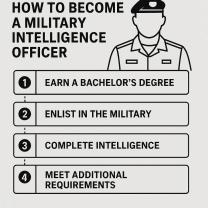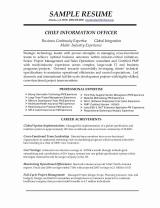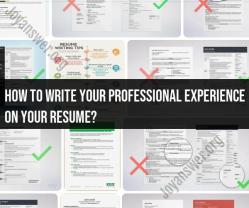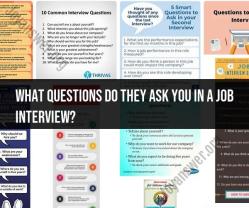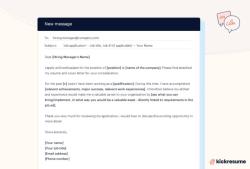How to find a job without using a job board?
Finding a job without relying solely on job boards involves a diversified and proactive approach to your job search. Here are alternative job search strategies to consider:
Networking:
- Leverage your professional and personal network. Inform friends, family, former colleagues, and acquaintances that you are actively seeking employment. Attend industry events, conferences, and meetups to expand your network.
LinkedIn and Social Media:
- Optimize your LinkedIn profile and use the platform for professional networking. Follow companies you're interested in, join relevant groups, and engage with industry professionals. Additionally, consider using other social media platforms strategically to connect with professionals and showcase your expertise.
Company Websites:
- Explore the career sections of company websites directly. Many companies post job openings on their websites before or in conjunction with posting them on job boards.
Industry Associations:
- Join industry associations related to your field. Attend events and participate in forums or discussion groups. Industry-specific job listings are often shared within these communities.
Recruitment Agencies:
- Connect with recruitment agencies or headhunters in your industry. Many companies rely on these agencies to find qualified candidates for open positions.
Professional Development Programs:
- Look for professional development programs, internships, or apprenticeships. These opportunities may not always be listed on job boards and can be a gateway to full-time employment.
Direct Outreach:
- Identify companies you're interested in working for and reach out directly. Send a targeted cover letter and resume to the company's HR department or hiring manager, expressing your interest and explaining how your skills align with their needs.
Freelancing and Contract Work:
- Consider freelancing or taking on contract work. Platforms like Upwork, Freelancer, or Fiverr can connect you with short-term projects, and these opportunities can sometimes lead to full-time positions.
Professional Associations:
- Join relevant professional associations related to your industry. Attend events, conferences, or webinars organized by these associations. Networking within your professional community can open up hidden job opportunities.
Alumni Networks:
- Tap into your alumni network from school or university. Many institutions have career services that can help connect you with alumni in your field.
Cold Calling/Emailing:
- Reach out directly to companies you are interested in working for, even if they don't have posted job openings. Express your interest in working with them and inquire about potential opportunities.
Volunteer Work:
- Consider volunteering or interning in your desired field. This not only helps you gain relevant experience but also expands your network and increases your chances of being considered for paid positions within the organization.
Remember to tailor your resume and cover letter for each application, showcasing how your skills and experiences align with the specific needs of the company. A multifaceted approach using these strategies can increase your visibility in the job market and lead to opportunities that may not be advertised on job boards.
How can one find a job without relying on job boards?
There are a number of ways to find a job without relying on job boards. Here are a few ideas:
- Network: One of the best ways to find a job is through networking. Talk to your friends, family, and former colleagues to see if they know of any job openings. You can also attend networking events and industry conferences to meet new people and learn about job opportunities.
- Reach out to companies directly: If you're interested in working for a specific company, even if they don't have any job openings listed, you can reach out to them directly. Send a resume and cover letter to the company's hiring manager or recruiter. You can also follow the company on social media and keep an eye out for any job announcements.
- Use search engines: You can use search engines to find job listings that aren't posted on job boards. Simply enter keywords related to the type of job you're looking for, such as "software engineer jobs" or "marketing manager jobs." You can also use search engines to find company websites and social media pages, where you may be able to find job listings that aren't posted elsewhere.
- Use staffing agencies: Staffing agencies can help you to find job openings that are a good fit for your skills and experience. You can register with multiple staffing agencies to increase your chances of finding a job.
What alternative methods and strategies are effective for job hunting?
In addition to the methods listed above, there are a number of other alternative methods and strategies that can be effective for job hunting. Here are a few more ideas:
- Volunteer: Volunteering is a great way to gain experience, network with people, and learn about new job opportunities. When volunteering, choose an organization that is relevant to your field of interest.
- Attend industry events: Industry events are a great way to learn about the latest trends in your field and to network with potential employers. Attend industry conferences, workshops, and meetups to stay up-to-date on the latest news and to meet new people.
- Create a personal website: A personal website is a great way to showcase your skills and experience to potential employers. Include your resume, a portfolio of your work, and any other relevant information on your website.
- Be active on social media: Use social media to connect with potential employers and to learn about job opportunities. Follow companies and industry leaders on social media, and participate in relevant conversations.
Are networking and direct applications viable approaches to securing employment?
Networking and direct applications are both viable approaches to securing employment. Networking can help you to learn about job openings that aren't posted elsewhere, and it can also help you to make a good impression on potential employers. Direct applications can be a good way to get your foot in the door at a company, even if they don't have any job openings listed.
Here are some tips for networking and direct applications:
- Be genuine: When networking, be genuine and authentic. Don't just approach people because you think they can help you get a job. Get to know people and build relationships with them.
- Be prepared: When applying for jobs directly, be sure to tailor your resume and cover letter to each specific job you apply for. Highlight your skills and experience that are most relevant to the job you're applying for.
- Follow up: After you network with someone or apply for a job, be sure to follow up. Send a thank-you note after networking, and check in with the hiring manager after you apply for a job.
By following these tips, you can increase your chances of finding a job without relying on job boards.







